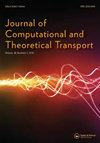Analytical Solution of a Gas Release Problem considering Permeation with Time-Dependent Boundary Conditions
IF 1.1
4区 工程技术
Q3 MATHEMATICS, APPLIED
Journal of Computational and Theoretical Transport
Pub Date : 2020-11-09
DOI:10.1080/23324309.2020.1828469
引用次数: 4
Abstract
Abstract In preparation for determining material properties such as Sieverts’ constant (solubility) and diffusivity (transport rate) we give a detailed discussion on a model describing some gas release experiment. Aiming to simulate the time-dependent hydrogen fluxes and concentration profiles efficiently, we provide an analytical solution for the diffusion equations on a cylindrical specimen and a cylindrical container for three boundary conditions (B.C.). These (B.C.) occur in three phases – loading phase, evacuation phase and gas release phase. In the loading phase the specimen is charged with hydrogen assuring a constant partial pressure of hydrogen. The gas will be quickly removed in the second phase, in the third phase, the hydrogen is released from the specimen to the gaseous phase. The diffusion equation in each phase is a simple homogeneous equation. Due to the complex time-dependent (B.C.), we transform the homogeneous equations to the non-homogeneous ones with a zero Dirichlet (B.C.). Compared with the time consuming numerical methods our analytical approach has an advantage that the flux of desorbed hydrogen can be explicitly given and therefore can be evaluated efficiently. Our analytical solution also assures that the (B.C.) are exactly satisfied. The interaction between specimen and container is taken into account.考虑渗透时边界条件下气体释放问题的解析解
摘要为了准备测定材料的Sieverts常数(溶解度)和扩散率(输运率)等性质,我们详细讨论了描述气体释放实验的模型。为了有效地模拟随时间变化的氢通量和浓度分布,我们给出了三种边界条件下圆柱形试样和圆柱形容器上的扩散方程的解析解。这些(B.C.)发生在三个阶段-加载阶段,疏散阶段和气体释放阶段。在加载阶段,试样被充氢,以保证氢的分压恒定。在第二阶段,气体将被迅速除去,在第三阶段,氢从样品中释放到气相。各相的扩散方程是一个简单的齐次方程。由于复时相关(bc),我们将齐次方程转化为具有零Dirichlet (bc)的非齐次方程。与耗时的数值方法相比,该方法的优点是可以明确地给出解吸氢的通量,从而可以有效地进行计算。我们的解析解也保证了(bc)是完全满足的。考虑了试样与容器之间的相互作用。
本文章由计算机程序翻译,如有差异,请以英文原文为准。
求助全文
约1分钟内获得全文
求助全文
来源期刊

Journal of Computational and Theoretical Transport
Mathematics-Mathematical Physics
CiteScore
1.30
自引率
0.00%
发文量
15
期刊介绍:
Emphasizing computational methods and theoretical studies, this unique journal invites articles on neutral-particle transport, kinetic theory, radiative transfer, charged-particle transport, and macroscopic transport phenomena. In addition, the journal encourages articles on uncertainty quantification related to these fields. Offering a range of information and research methodologies unavailable elsewhere, Journal of Computational and Theoretical Transport brings together closely related mathematical concepts and techniques to encourage a productive, interdisciplinary exchange of ideas.
 求助内容:
求助内容: 应助结果提醒方式:
应助结果提醒方式:


